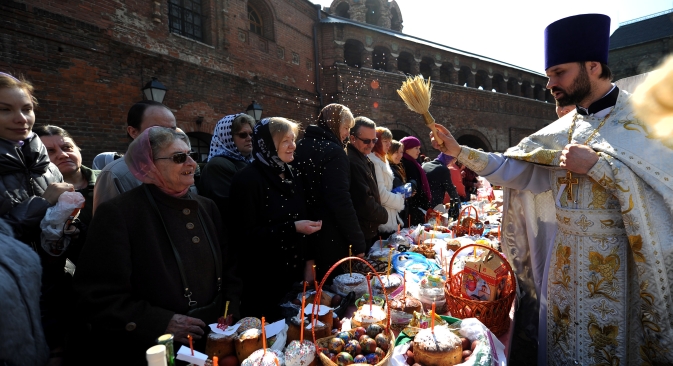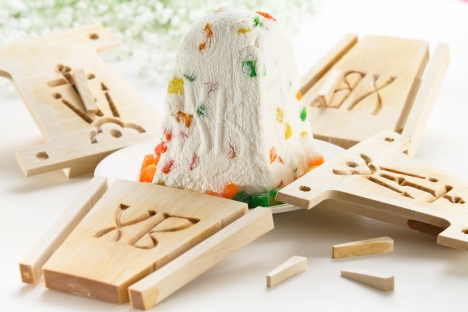Orthodox ritual meets Soviet custom on Easter celebrations

Easter is one of the most important religious holidays celebrated by Orthodox Russians. Source: AFP / East news
Orthodox Christians celebrate Easter on May 5. This is the most important celebration on the Christian calendar. During Soviet times, taking part in Easter festivities was not encouraged; as a result, Russian Easter traditions are still layered with Soviet aspects today.
Easter festivities begin with a celebratory evening church service, accompanied by a procession of the cross. During the procession, priests walk around the church counter-clockwise, carrying icons and singing prayers; parishioners eventually join the procession.
Related:
It is believed that, as the procession finishes, this marks the end of Great Lent – and then people can eat whatever they please.
Among the food enjoyed over the Orthodox Easter are painted eggs, Easter cake and “Paska” bread, which is made with cottage cheese and raisins. These dishes are “blessed” during the church service. One of the blessed eggs is traditionally kept until the following Easter, and it is said that the egg will not rot for the entire year.
Despite the fact that this religion was forbidden during the Soviet era, practically every household still painted eggs every year. There was not a particular religious meaning attached to this tradition, but Easter was celebrated all the same.
“We had a favorite game, which meant we looked forward to Easter every year,” says Natalia, a pensioner. “Two people take an egg each and tap them against each other. The one whose egg remains intact takes the cracked one; so, as you went through the village from door to door, you could end up with quite a few."
"You didn’t necessarily have to eat all the ‘trophy eggs’ though; when we were quite full, we would simply share the eggs with anyone who wanted them," she continues.
Celebrating Easter in Russia. Source: ITAR-TASS
"My family was not religious: My mother was a teacher, and my father was an electrician and a war veteran. And, yet, over the Easter holidays, I’d sneak off to church with my grandmother, where I would always be spoiled with sweets. Of course, I’d always be in trouble with my parents when I got home, for disgracing them,” Natalia says.
One of the traditions associated with the official prohibition of religious celebrations is the Easter custom of visiting cemeteries and tending the graves of relatives who have passed away. This tradition has always been widely practiced.
After the Orthodox Church was liberated and began to enjoy the support of the government, important public figures started attending all the main church services.
“Visiting cemeteries and leaving Easter eggs and cakes is originally a pagan tradition, which started to become popular again during the Soviet era,” says the Rev. Alexander. “As it was difficult to practice the Orthodox faith during Soviet times, certain strong superstitions have emerged. At Easter, it is essential to go to church.
"I can say that, generally, people in Russia are Orthodox, although not many are in the habit of going to church. However, at Easter, people come to church, even though you’d never see them any other day of the year. Now, wouldn’t you call that a miracle of the Lord?” the Rev. Alexander explains.
{***}

Easter is the main Christian holiday in Russia. Source: Lori / Legion media
After church, it is time to break the Great Lent fast: There is a celebratory dinner, which marks both the end of Great Lent and the beginning of the brightest day of the year.
It is, however, important to remember that a fast – especially a strict one – puts serious stress on the organism, which means it must be broken gently and gradually. Doctors do not recommend starting with heavy meat dishes.
It is better to begin with boiled meat and vegetables on the first day (perhaps some salad and herbs), and then gradually introduce dairy products.
“In my family, we usually celebrate with my mother-in-law and father-in-law, at their place,” says Sergei, a computer programmer. “For them, this holiday is not so much about religion as it is about family. It is an occasion that brings all their children and grandchildren together around the table."
"Strangely enough, I tend to miss dairy products much more than meat," Sergei says. "I spend all day on Sunday drinking ‘kefir’ [a fermented milk drink] and eating yoghurt, though not uncontrollably. Everything happens quite calmly, without any fuss; you can see your body has become acclimatized to a modest diet as a result of the fast. In the middle of the day, we have lamb, Paska bread and a little alcohol.”
On the night before Easter, all the churches are full of people, of course; although, for certain “parishioners,” this is just an excuse to drink. Night falls and the whole city is out celebrating – rather like New Year’s, right? Some even swear that they have seen people actually handing out glasses and drinking alcohol in the church itself, during the service.
“Every year I take part in the Easter service; although, admittedly, not as a parishioner, but in the line of service,” says Roman, a fire-inspector. “I make sure there aren’t any emergencies, although, unfortunately, they do occur more often than you might think."
"On more than one occasion, I have had to rescue women whose clothes have caught fire from the candles," Roman remembers. "All it takes is for an elderly lady in a fluffy scarf, holding a candle, to lean forward – and then suddenly she’s ablaze. Nowadays, if I ever see someone in a scarf during the service, I go up to them straight away and remind them to be careful.”
The Easter celebrations continue for a whole week after the Resurrection of Christ, and celebratory services take place in the churches all week long.
Even if there are burial services during this time, the ritual itself takes place with a special Easter sermon and a large number of joyful prayers about the miracle of the Resurrection. Easter week is also unique in that it is the only time of year when anyone can have the chance to ring the church bells.
“My children look forward to ringing the bells all year long,” says Sergei. “We usually get together with friends who have young children and go to church. It’s best to arrive just after the evening service finishes, around 7 p.m."
"All you have to do is go up to any of the priests and ask: ‘Please give your blessing that I may ring the bells in the glory of Christ.’ I’ve never known a priest to refuse," Sergei says.
"Ringing the bells gives you an unforgettable feeling. At first it’s a little difficult, but, as you get the hang of it, you understand the rhythm and you can play something more or less intelligible. And, of course, the children are just delighted. The main thing is to keep an eye on the really little ones though, as the bells are still quite high,” he says.
All rights reserved by Rossiyskaya Gazeta.
Subscribe
to our newsletter!
Get the week's best stories straight to your inbox
